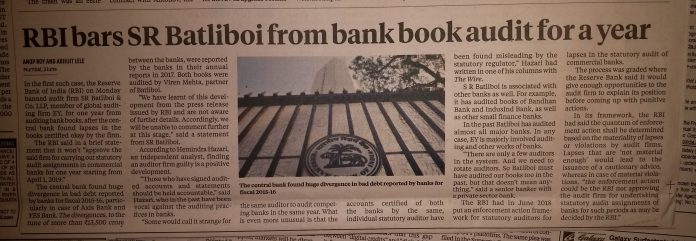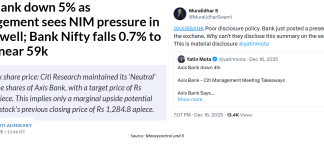Anup Roy & Abhijit Lele | Mumbai Last Updated at June 4, 2019 02:13 IST
In the first such case, the Reserve Bank of India (RBI) on Monday banned audit firm SR Batliboi & Co. LLP, member of global auditing firm EY, for one year from auditing bank books, after the central bank found lapses in the books certified okay by the firm.
The RBI said in a brief statement that it won’t “approve the said firm from carrying out statutory audit assignments in commercial banks for one year starting from April 1, 2019”.
The central bank found huge divergence in bad debt reported by banks for 2015-16, particularly in the case of Axis Bank and YES Bank. The divergences, to the tune of more than Rs13,500 crore between the banks, were reported by the banks in their annual reports in 2017.
Both books were audited by Viren Mehta, partner, Batliboi. “We have learnt of this development from the press release issued by the RBI and are not aware of further details. Accordingly, we will be unable to comment further at this stage,” read a statement from SR Batliboi.
According to Hemindra Hazari, an independent analyst, finding an auditor firm guilty is a positive development. “Those who have signed audited accounts and statements should be held accountable,” said Hazari, who in the past has been vocal against the auditing practices in banks.
“Some would call it strange for the same auditor to audit competing banks in the same year. What is even more unusual is that the accounts certified of both the banks by the same, individual statutory auditor have been found misleading by the statutory regulator,” Hazari had written in one of his columns for The Wire.
SR Batliboi is associated with other banks as well. For example, it has audited books of Bandhan Bank and IndusInd Bank, as well as other small finance banks.
In the past, SR Batliboi has audited almost all major banks. In any case, EY is majorly involved in auditing and other works of banks.
“There are only a few auditors in the system. And we need to rotate them. So, SR Batliboi must have audited our books in the past, but that doesn’t mean anything,” said a senior banker with a private sector bank.
The RBI had in June 2018 put an enforcement action framework for statutory auditors for lapses in the statutory audit of commercial banks. The process was graded where the RBI said it would give enough opportunities to the audit firm to explain its position before coming up with punitive action.
In its framework, the RBI had said the quantum of enforcement action shall be determined based on the materiality of lapses or violations by audit firms. Lapses that are ‘not material enough’ would lead to the issuance of a cautionary advice, whereas in the case of material violations, “the enforcement action could be the RBI not approving the audit firm for undertaking statutory audit assignments of banks for such periods as may be decided by the RBI”.
First Published: Mon, June 03 2019. 23:03 IST














